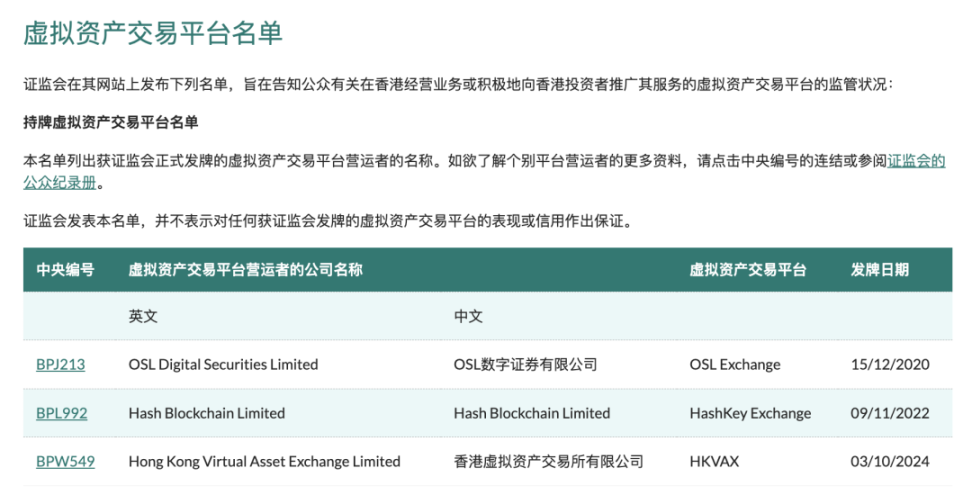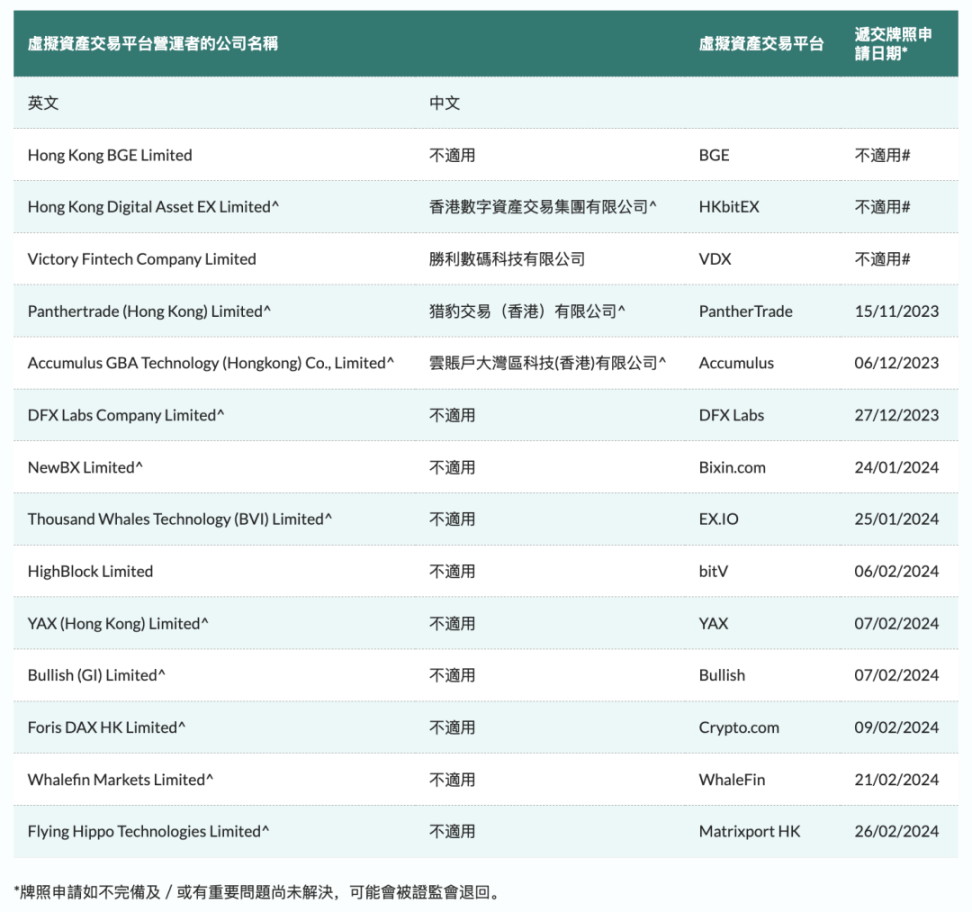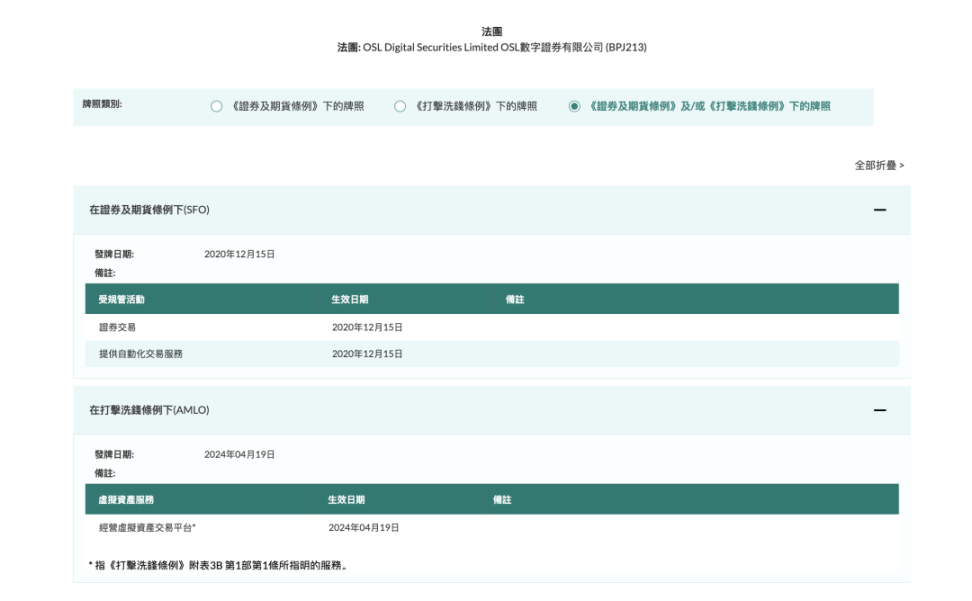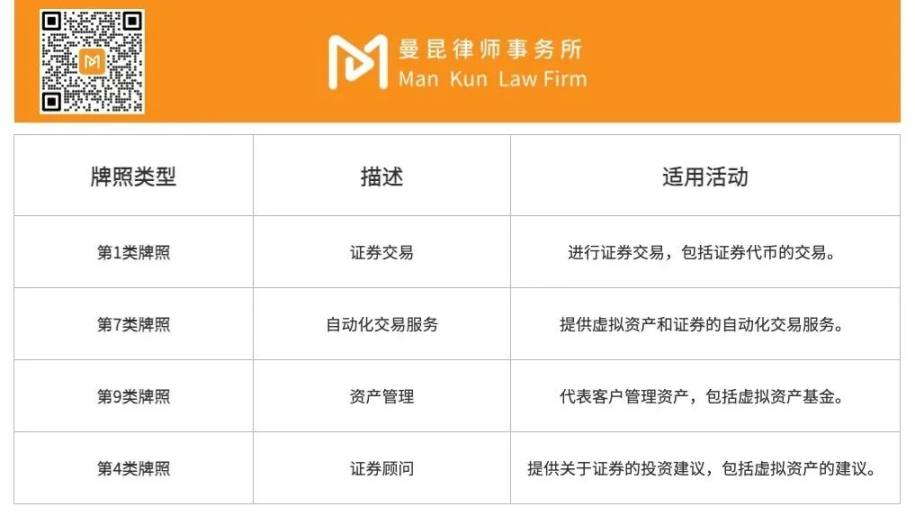Licenses and Permits: "Confused and Unclear."
Written by: Liu Honglin, Founder of Shanghai Mankun Law Firm;
Bai Zhen, Head of Hong Kong Office, Shanghai Mankun Law Firm
On October 3, 2024, the Hong Kong Securities and Futures Commission (SFC) updated the list of licensed virtual asset trading platforms on its official website, announcing the latest licensed exchange, HKVAX. This is the third virtual currency exchange recognized by Hong Kong regulatory authorities, following OSL Exchange and HashKey Exchange. According to a report by the well-known Hong Kong news media Ming Pao, HKVAX has obtained SFC-issued licenses 1 (Securities Trading) and 7 (Automated Trading Services), providing OTC brokerage services, virtual currency trading, and comprehensive virtual asset custody services for Hong Kong virtual currency investors.

This may raise the question: I also want to operate a compliant virtual currency exchange in Hong Kong. Should I apply for a virtual asset trading platform license, or do I need to obtain licenses 1 and 7? Do other virtual currency exchanges operate this way? Before answering this question, Mankun lawyers will first help you understand what licenses the currently licensed or considered licensed virtual currency exchanges hold.
Overview of Licensed Virtual Asset Trading Platforms in Hong Kong
Currently, based on the list of licensed and applying virtual asset trading platforms on the Hong Kong SFC website, Mankun lawyers have conducted a simple inventory of licenses.

- OSL Exchange, has obtained licenses 1 and 7, and a license to operate a virtual asset trading platform
- HashKey Group, different platforms under it have obtained different licenses, including:
- Hash Blockchain Limited, i.e., HashKey Exchange has obtained licenses 1 and 7, and a license to operate a virtual asset trading platform
- HBS (Hong Kong) Limited, has obtained licenses 1 and 4
- HashKey Capital Limited, has obtained licenses 4 and 9
- HKVAX, has obtained licenses 1 and 7
- BGE, does not hold any licenses
- HKbitEX, considered to have obtained a license to operate a virtual asset trading platform
- VDX, does not hold any licenses
- PantherTrade, considered to have obtained a license to operate a virtual asset trading platform
- Accumulus, considered to have obtained a license to operate a virtual asset trading platform
- DFX Labs, considered to have obtained a license to operate a virtual asset trading platform
- Bixin.com, considered to have obtained a license to operate a virtual asset trading platform
- EX.IO, considered to have obtained a license to operate a virtual asset trading platform
- bitV, does not hold any licenses
- YAX, considered to have obtained a license to operate a virtual asset trading platform
- Bullish, considered to have obtained a license to operate a virtual asset trading platform
- Crypto.com, considered to have obtained a license to operate a virtual asset trading platform
- WhaleFin, considered to have obtained a license to operate a virtual asset trading platform
- Matrixport HK, considered to have obtained a license to operate a virtual asset trading platform
It is worth noting that although most platforms are currently marked as "considered licensed," this status means that the platform is still in a temporary licensing phase, and they can only provide virtual asset services under specific restrictions, primarily targeting professional investors. In this status, platforms are not allowed to provide services to retail investors, and the scope of services they can offer is quite limited. Specifically, these platforms cannot engage in margin trading, virtual asset derivatives (such as futures contracts) trading, nor can they provide asset lending, market making, or other high-risk financial activities.
It can be observed that most virtual asset exchanges currently do not hold licenses issued by the SFC; rather, they have applied for a virtual asset trading platform license. However, the only three exchanges that have obtained a virtual asset trading platform license also hold licenses 1 and 7.
So, what is the relationship between the virtual asset trading platform license and the virtual asset (VA) licenses? Is it necessary to hold licenses 1 and 7 to obtain a virtual asset trading platform license?
Virtual Asset Trading Platform License and Licenses
In Hong Kong, any centralized virtual asset trading platform must obtain a license and regulation from the Hong Kong Securities and Futures Commission (SFC) if it (1) is conducting business; or (2) is actively promoting services to Hong Kong investors. This requirement stems from two important financial regulations in Hong Kong:

1. Securities and Futures Ordinance (SFO)
The regulatory framework under the SFO aims to regulate the following centralized platforms, involving licenses such as 1 and 7:
- Using automated trading engines to match customer orders and provide trading services for security tokens; and
- Providing custody services as an ancillary service to trading services.
2. Anti-Money Laundering and Counter-Terrorist Financing Ordinance (AMLO)
AMLO involves the licensing of virtual asset trading platforms. Its regulatory framework aims to regulate the following centralized platforms:
- Using automated trading engines to match customer orders and provide trading services for non-security tokens; and
- Providing custody services as an ancillary service to trading services.
However, given the often-changing nature of virtual assets, a virtual asset may transition from a non-security token to a security token, and vice versa. Therefore, the Hong Kong SFC recommends that companies take a cautious approach, meaning that virtual asset trading platforms should apply for licenses under both the SFO and AMLO frameworks to avoid violating licensing regulations and ensure business continuity.
So, what do licenses 1 and 7 correspond to in terms of business? Besides these two licenses, are there any other licenses needed to operate virtual asset-related businesses in Hong Kong? Why does HashKey also hold licenses 4 and 9? This leads us to discuss the overview of financial licenses in Hong Kong.
Overview of Financial Licenses in Hong Kong
According to the Securities and Futures Ordinance (SFO) in Hong Kong, the financial market is divided into several categories, and market participants in each category must apply for the corresponding licenses. Here are some common licenses and their applicable businesses:
- License 1, allows the licensee to conduct securities trading, including buying and selling securities, providing securities investment services to clients, etc.
- License 2, authorizes engaging in futures contract trading business.
- License 3, used for leveraged foreign exchange trading platforms.
- License 4, allows the licensee to provide investment advice related to securities to clients.
- License 5, used for consulting services related to futures contracts.
- License 6, allows the licensee to provide consulting services related to corporate financing, involving capital market operations, mergers and acquisitions, listings, etc.
- License 7, allows the platform to provide automated trading services to clients.
- License 8, allows the licensee to engage in securities financing activities.
- License 9, is a license that asset management companies must hold.
- License 10, involves credit rating services.
At this point, a new question arises: with so many licenses, do I need to apply for all of them if I want to engage in virtual currency-related business in Hong Kong? The answer from Mankun lawyers is, no, you do not!
Apply for the Necessary Licenses Based on Business Activities
Previously, Mankun lawyers shared an article titled “Hong Kong Virtual Currency License Application: What is the Difference Between VASP and VATP? | Mankun Web3 Legal Knowledge”, which detailed various virtual currency-related businesses. The article pointed out that virtual asset service providers (VASP) encompass a variety of entities, including but not limited to:
- Virtual asset fund managers;
- Virtual asset advisors;
- Virtual asset custodians;
- Virtual asset wallet providers; and
- Financial service providers related to the issuance, sale, or distribution of virtual assets, such as service providers in ICO projects.
Correspondingly, if you are conducting virtual asset trading-related business in Hong Kong, you will generally need to apply for and hold licenses 1, 4, 7, and 9, depending on the type of services provided:

If you only plan to operate a virtual currency exchange in Hong Kong, besides the virtual asset trading platform license, you only need to consider licenses 1 and 7:
- License 1 is applicable to trading platforms involving security-type virtual assets. In the field of virtual currency, some virtual assets may structurally be considered securities; therefore, operating a virtual asset exchange may require a license 1 to legally trade these assets.
- License 7 is a license that almost all virtual currency exchanges need, as virtual currency exchanges primarily conduct automated virtual asset trading through electronic platforms.
At the same time, if you are a traditional financial institution but also want to try to connect with virtual assets, you can refer to Tiger Brokers and ZA Bank, applying for and holding a license 1 that includes virtual asset trading.
Of course, engaging in virtual asset-related business does not necessarily mean providing trading services to investors; you can also venture into areas such as providing investment consulting and advice, which would require considering license 4. Whether a company or an individual, those involved in crypto investment sharing groups or virtual currency investment advising must hold a license 4 to operate, or they will face regulatory issues.

Additionally, if you wish to legally manage investment portfolios that include virtual assets in Hong Kong and provide related investment services, you must apply for license 9 for virtual assets (VA). Some investment companies that already hold license 9 only need to upgrade their license to invest in various virtual assets, including but not limited to Bitcoin, Ethereum, and other cryptocurrencies and tokens. These investments can include direct holdings of virtual assets or indirect investments through derivatives and other financial instruments.
It is worth noting that fund managers holding license 9 can conduct securities trading and provide advisory activities without needing to apply for additional licenses 1 and 4. This seems to imply that if you want to operate a company similar to HashKey Group in Hong Kong, covering trading platforms, investment management, and consulting, the most convenient way would be to directly apply for licenses 7, 9, and a virtual asset trading platform license.
Summary by Mankun Lawyers
As of early October, only three companies can truly provide compliant trading services directly to virtual asset investors in Hong Kong. Traditional brokers and other financial institutions in the market typically collaborate with these licensed virtual asset trading platforms to provide indirect virtual asset trading services to their users. This also means that whoever obtains a compliant license first will have more say in the Hong Kong virtual asset trading market.
免责声明:本文章仅代表作者个人观点,不代表本平台的立场和观点。本文章仅供信息分享,不构成对任何人的任何投资建议。用户与作者之间的任何争议,与本平台无关。如网页中刊载的文章或图片涉及侵权,请提供相关的权利证明和身份证明发送邮件到support@aicoin.com,本平台相关工作人员将会进行核查。



